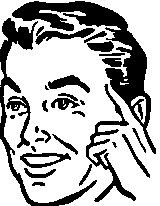Listen to reason
Ordinarily, the books I read, whatever book I'm reading at the moment, and books that most people have never heard of, or maybe have heard of but aren't really aware of. The Demon-Haunted World by Carl Sagan. Dance of Death by Douglas Preston and Lincoln Child. The Tale of Despereaux by Kate DiCamillo. Ask any Joe or Jane in the mall about them and you'll get a shrug and a blank stare. Who reads, anyway?
The last "celebrated" book I read was The Da Vinci Code by Dan Brown. Other people who read it seemed to enjoy it, and a few really took it to heart, this in spite of its being goofily conceived and only competently drafted. Why did people take it so seriously? Because it dealt with religious themes that people feel seriously about, and it did so irreverently. Also, people who are not widely read in fantasy fiction often do not appreciate the idea of "alternate history" that mixes real people and events with invented ones. It's a mental block. In a sense all fiction that's set on a recognizable Earth is alternate history, but some people are so inadept at suspending their disbelief that they can't entertain notions of "what if" when they know or believe that it never happened that way.
Anybody who ever objected to The Da Vinci Code on factual grounds probably couldn't read one of those books where the South wins the Civil War or Germany wins World War II -- not without their heads exploding, anyway. When the Da Vinci Code turmoil was at its peak we got to see a lot of exploding heads.
Right now I'm reading a book that got a lot of attention about 37 years ago: The Godfather by Mario Puzo. For once I can tell someone what I'm reading and they won't say, "Huh?" Even people who haven't read the book, or any other book, know this one. I understand it even got turned into a movie at some point. But The Godfather, decades old and taking place decades before that, holds up great as a dramatic story with interesting and deeply flawed characters struggling with the world and their own circumstances.
I think it's a shame that the book is so totally overshadowed by its offshoots. In reading it now I can see that there's very little in the movies that was original with the filmmakers. It's all in the book. If you Google "godfather" the way I just did, most of the links refer to either the movies, the recent video games, or the pizza franchise. The only other reference that stands out is James Brown, the Godfather of Soul; does that nickname predate the book?
Big chunks of The Godfather are written in a narrative style like nonfiction, just as if Puzo were telling about some real-life big business venture or political dynasty. Also, while the characters are always hiding their thoughts from each other, Puzo spells out for the reader what everyone is thinking and why they all feel justified in doing the horrible things that happen throughout the book. I guess that explains what's so compelling about the story to me. It deftly stimulates curiosity and then even more deftly satisfies it.


0 Comments:
Post a Comment
<< Home